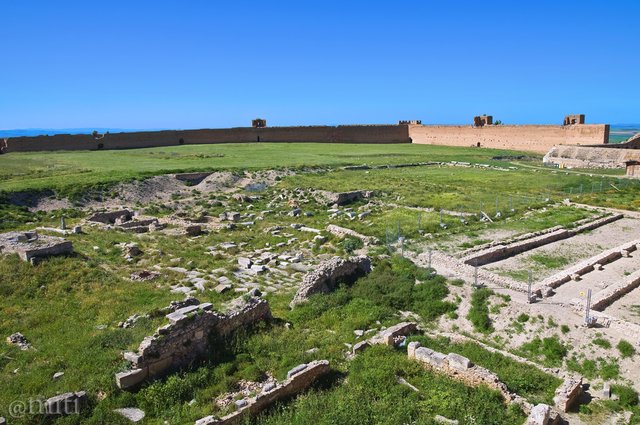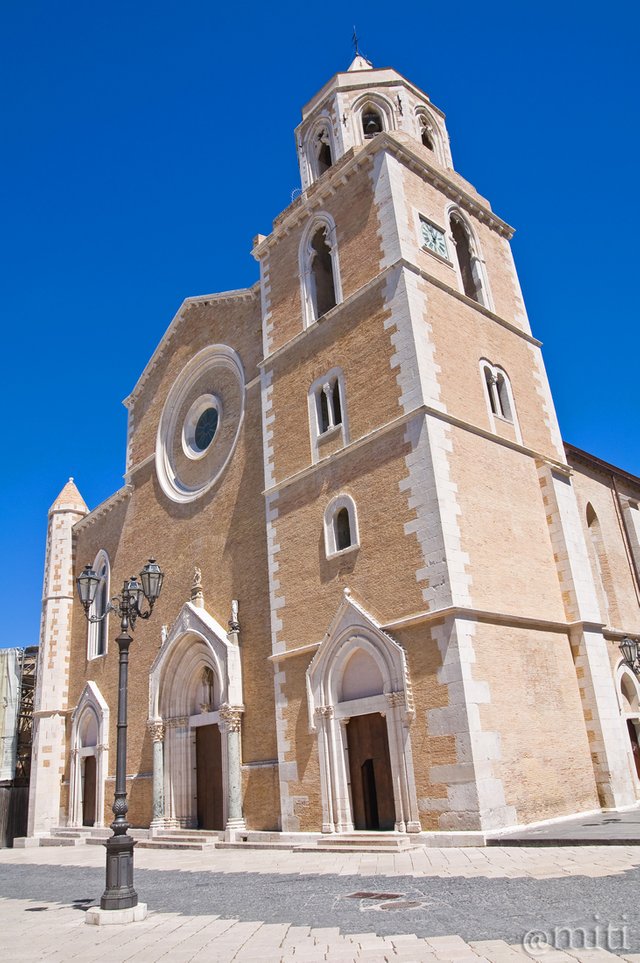
The Swabian Fortress of Lucera (Author's photo - All rights reserved)
Il castello Svevo di Lucera (Immagine dell'autore - tutti i diritti sono riservati)



Ciao a tutti,
questo è un viaggio attraverso l'Italia. Posterò una foto al giorno con una brevissima descrizione. Spero vi piaccia!

Lucera è una città nella provincia di Foggia, nella regione meridionale italiana della Puglia. È un tesoro di arte e cultura, situato su tre colline da cui domina la piana del Tavoliere.
Gli scavi archeologici mostrano la presenza di un villaggio dell'età del bronzo all'interno dei confini della città. Lucera fu probabilmente chiamata con il nome di Lucio, un mitico re Dauno, o di un tempio dedicato alla dea Lux Cereris. Una terza possibilità è che la città sia stata fondata e nominata dagli Etruschi, nel qual caso il nome probabilmente significa "Bosco Sacro".
Lucera ebbe una storia travagliata durante il periodo romano passando da un imperatore romano a un altro mentre le battaglie per la supremazia erano combattute tra i leader romani. Finalmente sotto Ottaviano (che prese il nome di Augustus) la città entrò in un'era relativamente tranquilla e prospera e molti dei suoi monumenti romani sono di questo periodo. Il principale tra loro è l'anfiteatro romano.
L'anfiteatro romano è uno dei più grandi del Sud d'Italia e risale al I secolo a.C. E 'stato coperto nei secoli dai tempi di Augusto e riscoperto solo nel 1932. È possibile accedervi attraverso due grandi portali, uno di fronte all'altro, il primo verso Lucera e il secondo verso Foggia, entrambi decorati con bassorilievi e sostenuti da due colonne ioniche. Ora è completamente scoperto e in fase di restauro. All'epoca ben 18.000 spettatori potevano vedere i gladiatori combattere nello stesso.
Nel 1224, l'imperatore del Sacro Romano Impero Federico, rispondendo alle insurrezioni religiose in Sicilia, espulse tutti i musulmani dall'isola, trasferendone molti a Lucera nei due decenni successivi.
La colonia prosperò per 75 anni fino a quando fu saccheggiata nel 1300 da forze cristiane sotto il comando di Carlo II di Napoli. La maggior parte degli abitanti musulmani della città sono stati uccisi o - come è successo a quasi 10.000 di loro - venduti in schiavitù, o esiliati. Le loro moschee abbandonate furono demolite e di solito venivano costruite delle chiese al loro posto, compresa la cattedrale di Santa Maria della Vittoria (ora chiamata Santa Maria Assunta).
La cattedrale è in stile gotico e il suo altare in pietra era un tempo la tavola del banchetto del castello Fiorentino. Ha alcuni affreschi degni di nota del 15 ° secolo.
Il castello di Lucera, la fortezza svevo-angioina, fu costruito nel 13 ° secolo. Esso sorge su una collina la cui base è circondata da un muro difensivo lungo 900 metri con torri e contrafforti. Il castello fu gravemente danneggiato da un terremoto nel 1456 e poi ampiamente smantellato per riutilizzarne i materiali nel 18 ° secolo.
Da vedere anche la chiesa gotica di San Francesco con il suo grande rosone, le chiese di San Domenico, Santa Caterina, Carmine, S. Antonio Abate e gli eleganti palazzi, come Palazzo Lombardi, Palazzo di Città, Palazzo Mozzagrugno, Palazzo Vescovile e Palazzo Campagna, con eleganti decorazioni settecentesche e il bellissimo Teatro Garibaldi.
Cose da vedere: Il Centro Storico, la Cattedrale di Santa Maria Assunta, la Fortezza Svevo-Angioina,
l'Anfiteatro Romano, la Chiesa di San Francesco, la Chiesa di San Domenico, la Chiesa di Santa Caterina, la Chiesa del Carmine, la Chiesa di S. Antonio Abate, il Palazzo Lombardi, il Palazzo Comunale, il Palazzo Mozzagrugno, il Teatro Garibaldi, il Palazzo Vescovile, il Palazzo Campagna.

Hello everyone,
I began a Photo Journey through Italy. I will post one photo every day with a little note of explanation. I hope you like it!

Lucera is a town in the province of Foggia, in the southern Italian region of Puglia. It is a treasure trove of art and culture, located on three hills from which it overlooks the Tavoliere tableland.
Archeological excavations show the presence of a bronze age village inside the city boundaries. Lucera was probably named after either Lucius, a mythical Dauno king, or a temple dedicated to the goddess Lux Cereris. A third possibility is that the city was founded and named by the Etruscans, in which case the name probably means Holy Wood.
Lucera had a troubled history during Roman times passing from one Roman emperor to another as battles for supremacy were fought amongst the Roman leaders. Finally under Octavian (who took the name Augustus) the town entered a relatively peaceful and prosperous era and many of its Roman monuments are from this period. Chief amongst them is the Roman Ampitheatre.
The Roman Ampitheatre is one of the largest in the South of Italy and dates back to the 1st century BC. It was covered over in the centuries since Augustus' times and only rediscovered in 1932. It is possible to enter it through two big portals, one in front of the other, the first one towards Lucera and the second one toward Foggia, both decorated with low-reliefs and sustained by two Ionic columns. It is now fully excevated and undergoing restoration. 18,000 spectators could watch the gladiators battling in the ampitheatre.
In 1224, Holy Roman Emperor Frederick II, responding to religious uprisings in Sicily, expelled all Muslims from the island, transferring many to Lucera over the next two decades.
The colony thrived for 75 years until it was sacked in 1300 by Christian forces under the command of Charles II of Naples. The majority of the city's Muslim inhabitants were slaughtered or – as happened to almost 10,000 of them – sold into slavery, or exiled. Their abandoned mosques were demolished, and churches were usually built in their place, including the cathedral of Santa Maria della Vittoria (now called Santa Maria Assunta).
The cathedral is Gothic in style and its stone altar was once the banquet table of castle Fiorentino. It has some noteworthy 15th century frescoes.
Lucera's castle, the swabian-angevin fortress, was built in the 13th century. The castle stands on a hill the base of which is surrounded by a defensive wall 900m long with towers and buttresses. The castle was badly damaged by an earthquake in 1456 and then extensively dismantled for building materials in the 18th century.
Also worth seeing are the Gothic Church of San Francesco with its large Rose window, the churches of San Domenico, Santa Caterina, Chiesa del Carmine, S. Antonio Abate and the elegant palaces, such as that of Lombardi, Palazzo di Città, Palazzo Mozzagrugno, Garibaldi Theatre, the Bishop’s Palace and Palazzo Campagna, with elegant eighteenth-century decorations.
Thing to see: The Historic Centre, the Cathedral of Santa Maria Assunta, the Swabian-Angevin Fortress,
the Roman Ampitheatre, the Church of San Francesco, the Church of San Domenico, the Church of Santa Caterina, the Church of Carmine, the Church of S. Antonio Abate, Lombardi Palace, the Town Hall, Mozzagrugno Palace, the Garibaldi Theatre, the Bishop’s Palace, Campagna Palace.

| Tipo di foto / Category | Paesaggio / Landscape view |
| Esposizione / Settings | 1/250 sec, ISO 200, f/10 |
| Camera | Nikon D5000 |
| Lente / Lens | Tamron SP 17-50mm f/2.8 XR Di II LD |
| Filtro / Filter | Polarizzatore Hoya / Hoya Polarizing filter |
| Cavalletto / Tripod | Manfrotto MKC3-P01 |
| Località / Location | Lucera (Foggia), Italia |
| Software | Photoshop |


The Cathedral of Santa Maria Assunta(Author's photo - All rights reserved)
La Cattedrale di Santa Maria Assunta (Immagine dell'autore - tutti i diritti sono riservati)
beauty
Downvoting a post can decrease pending rewards and make it less visible. Common reasons:
Submit
Congratulations, Your Post Has Been Added To The Steemit Worldmap!
Author link: http://steemitworldmap.com?author=miti
Post link: http://steemitworldmap.com?post=a-journey-through-italy-one-photo-every-day-119-lucera-eng-ita
Want to have your post on the map too?
Downvoting a post can decrease pending rewards and make it less visible. Common reasons:
Submit
Devo fare il tuo stesso giro un giorno!!! :-)))
Downvoting a post can decrease pending rewards and make it less visible. Common reasons:
Submit
Sono sicuro che lo apprezzeresti molto! ;-)
Downvoting a post can decrease pending rewards and make it less visible. Common reasons:
Submit
Certamente :-D
Downvoting a post can decrease pending rewards and make it less visible. Common reasons:
Submit
Addirittura gli Etruschi fino a Foggia???
Non sapevo che l'estensione di questo popolo fosse arrivato fino a la.
Downvoting a post can decrease pending rewards and make it less visible. Common reasons:
Submit
Eh si.. diverse necropoli etrusche sono state scoperte in Puglia, soprattutto nella Daunia (quindi la zona del Gargano) ma ti soprenderebbe sapere che sono arrivati anche più a sud nella regione, stando sempre ai ritrovamenti.
Downvoting a post can decrease pending rewards and make it less visible. Common reasons:
Submit
It seems that sight is historical.
@alexKARKI
Downvoting a post can decrease pending rewards and make it less visible. Common reasons:
Submit
Yes, of course it is!
Downvoting a post can decrease pending rewards and make it less visible. Common reasons:
Submit
Cheers!
Downvoting a post can decrease pending rewards and make it less visible. Common reasons:
Submit
You got a 49.03% upvote from @ocdb courtesy of @miti!
Downvoting a post can decrease pending rewards and make it less visible. Common reasons:
Submit
Wow Another good Photography..
what view...
thanks @miti
Downvoting a post can decrease pending rewards and make it less visible. Common reasons:
Submit
You're welcome.
Downvoting a post can decrease pending rewards and make it less visible. Common reasons:
Submit
Hello, if you want i can translate your post into spanish for a perquisite, you will have more followers in different language.
Downvoting a post can decrease pending rewards and make it less visible. Common reasons:
Submit
No, I'm not interested.... but thank you for your kindness.
Downvoting a post can decrease pending rewards and make it less visible. Common reasons:
Submit
Hi photos are stunning looks beautiful. Every photograph had their own history.
Italy is such a beautiful country.
Downvoting a post can decrease pending rewards and make it less visible. Common reasons:
Submit
Awesome pic 🌈
Downvoting a post can decrease pending rewards and make it less visible. Common reasons:
Submit
Thanks
Downvoting a post can decrease pending rewards and make it less visible. Common reasons:
Submit
Great Photography.
Downvoting a post can decrease pending rewards and make it less visible. Common reasons:
Submit
Performing journey here
Downvoting a post can decrease pending rewards and make it less visible. Common reasons:
Submit
Thanks
Downvoting a post can decrease pending rewards and make it less visible. Common reasons:
Submit
Wow!
When Italy is mentioned, I could always remember the greatest and famous Saints from this land.
Downvoting a post can decrease pending rewards and make it less visible. Common reasons:
Submit
My advice to you: don't put images in every comment you write. You seriously risk a flag.
Downvoting a post can decrease pending rewards and make it less visible. Common reasons:
Submit
Oh sorry for that.
Downvoting a post can decrease pending rewards and make it less visible. Common reasons:
Submit
I hope to visit Italy
Downvoting a post can decrease pending rewards and make it less visible. Common reasons:
Submit
I wish that for you.
Downvoting a post can decrease pending rewards and make it less visible. Common reasons:
Submit
Why?
Downvoting a post can decrease pending rewards and make it less visible. Common reasons:
Submit
Sorry, a small mistake in the writing 😉
Downvoting a post can decrease pending rewards and make it less visible. Common reasons:
Submit
It's ok
Downvoting a post can decrease pending rewards and make it less visible. Common reasons:
Submit
Nice pic
Downvoting a post can decrease pending rewards and make it less visible. Common reasons:
Submit
You're just complimenting me on my photo and you upvote your comment but not my post? No no no, very bad attitude!
Downvoting a post can decrease pending rewards and make it less visible. Common reasons:
Submit
He's a spammer and besides, many people do that.
I had a woman once, a follower complementing almost all my posts and not once give me an upvote. Never! I told her not to bother and she stopped.
Downvoting a post can decrease pending rewards and make it less visible. Common reasons:
Submit
OLE OLE OLE OLE A TRABAJAR DURO POR LO QUE QUEREMOS Y DESEAMOS SIN IMPORTAR LAS OPINIONES DE LAS PERSONAS TOXICAS.
SOY COMO UN ROBOT Y A LA VEZ NO. ME AGRADA TU ESFUERZO EN ESTE POST. PERSEVERANCIA Y TENACIDAD LA CLAVE PARA GRANDES LOGROS.
full motivacion si este mundo no es para nosotros, creemos un mundo nuevo.
@Venezlong un canal dedicado para Motivar y empoderar a las personas Visitame, sigueme ya yo lo hice.
Gracias a google por la imagen.
Downvoting a post can decrease pending rewards and make it less visible. Common reasons:
Submit
Your comment is considered SPAM... Take a look in this guide:
https://steemit.com/steemit/@miti/a-complete-guide-for-newcomers-and-minnows-to-avoid-a-possible-spam-and-to-write-good-comments
It will help you.
Downvoting a post can decrease pending rewards and make it less visible. Common reasons:
Submit
Nice photo... Good post
Posted using Partiko Android
Downvoting a post can decrease pending rewards and make it less visible. Common reasons:
Submit
Your comment is considered SPAM... Take a look in this guide:
https://steemit.com/steemit/@miti/a-complete-guide-for-newcomers-and-minnows-to-avoid-a-possible-spam-and-to-write-good-comments
It will help you.
Downvoting a post can decrease pending rewards and make it less visible. Common reasons:
Submit